|
|
|
Sort Order |
|
|
|
Items / Page
|
|
|
|
|
|
|
| Srl | Item |
| 1 |
ID:
138807
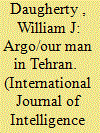

|
|
|
|
|
| Summary/Abstract |
Most filmgoers are likely familiar with the Academy Award-winning movie Argo, Hollywood's rather imaginative account of the rescue of six American diplomats sheltered by the Canadian ambassador to Iran after the capture of the U.S. Embassy in Tehran in November 1979. (Winning the 2013 Oscar for Best Picture brought the film a great deal of additional publicity.) Others may have read the book of the same name by retired Central Intelligence Agency (CIA) officer Antonio (Tony) Mendez. 1 Or they might have read Tony's earlier article on the same operation in the CIA's internal professional journal Studies in Intelligence shortly after its declassification.
|
|
|
|
|
|
|
|
|
|
|
|
|
|
|
|
| 2 |
ID:
138805
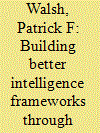

|
|
|
|
|
| Summary/Abstract |
Since 11 September 2001 (9/11), extensive intelligence reform has brought many changes to the “Five Eyes/5 Eyes” intelligence communities. 1 For example, one major theme in the reform agenda has been to “fuse” intelligence more effectively within intelligence agencies and across communities. Questions remain however, as to whether such reform efforts have been effective. Has the rush to fusion resulted in greater effectiveness or additional fragmentation of intelligence?
|
|
|
|
|
|
|
|
|
|
|
|
|
|
|
|
| 3 |
ID:
138806


|
|
|
|
|
| Summary/Abstract |
Following the passage of the Counterintelligence (CI) Enhancement Act of 2002 1 U.S. government agencies that conduct CI have sought to increase collaboration with the public, other organizations and businesses, through partnerships and alliances. Despite these successes, CI personnel may underestimate what they have to offer to interested third parties who could become critical allies. Hence the question: How should CI outreach be conducted and shaped in order to create a strategic CI advantage? Correlative questions include: Should outreach operations and networks stay the same, evolve slowly, incrementally, or naturally over time, or be radically altered? How might current outreach programs be re-configured or deployed in order to meet evolving intelligence threats, operations, and challenges? While law enforcement has its informant networks, and traditional intelligence agencies often focus on managing their case load of assets, CI organizations may lack a strategically assembled network of support. Yet, organizations can evaluate their outreach operations and clients and then calibrate their network of relationships to enhance effectiveness and create a durable advantage over their adversaries.
|
|
|
|
|
|
|
|
|
|
|
|
|
|
|
|
| 4 |
ID:
138800


|
|
|
|
|
| Summary/Abstract |
The history of Cold War espionage—KGB vs. CIA—remains incomplete, full of inaccuracies, and cries out for correction. It received a big infusion after 1991 by the opening of some files from both East and West, but that left the more biting questions unanswered—like those pertaining to still-unknown moles inside Western governments and intelligence services. Those undiscovered traitors still hover like ghosts over that history.
|
|
|
|
|
|
|
|
|
|
|
|
|
|
|
|
| 5 |
ID:
138801
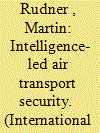

|
|
|
|
|
| Summary/Abstract |
International terrorism has a history of targeting airliners and airports. The deadliest-ever single act of terror against civil aviation was the 1985 bombing by Sikh terrorists of Air India flight 182 from Toronto over the Irish coast, with a loss of 329 passengers and 22 crew members. Since the 1990s, civil aviation has emerged as a principal target for various militant Islamist groups. Certain foreign governments, among them the Islamic Republic of Iran, are known to deploy client terrorist groups, like Hizbullah, for terrorist operations against countries toward which they are hostile. State-sponsored terrorism was responsible for the 1988 bombing of Pan Am flight 103 over Lockerbie, Scotland, with the loss of 259 lives, for which a Libyan intelligence officer was subsequently convicted but subsequently released before completing his jail term.
|
|
|
|
|
|
|
|
|
|
|
|
|
|
|
|
| 6 |
ID:
138803
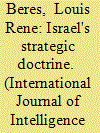

|
|
|
|
|
| Summary/Abstract |
If, as expected, Iran's ongoing nuclearization continues unimpaired, Israel will soon need to make certain basic revisions to its core strategic doctrine. These revisions would be substantially oriented toward enhancing the Jewish State's now-indispensable nuclear deterrence posture. Although largely counter-intuitive, such enhancement would actually require Israel to “disclose,” in carefully calculated increments, certain hitherto “ambiguous” aspects of the country's nuclear forces and infrastructures. In any such unique and unprecedented effort to systematically remove the “bomb from the basement,” major responsibilities for apprising political decisionmakers will fall upon the Israel Intelligence Community (IIC), most plainly MI (Military Intelligence, orAman) and the Israel Defense Force (IDF) Planning Branch. The IIC will need to be concerned with the following strategic doctrinal revisions.
|
|
|
|
|
|
|
|
|
|
|
|
|
|
|
|
| 7 |
ID:
138804
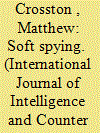

|
|
|
|
|
| Summary/Abstract |
Despite Hollywood romanticizing about the fictional escapades of various James Bonds and Jason Bournes, one of the most prevalent forms of modern intelligence activity is arguably the least emphasized: economic and industrial espionage. Aimed at garnering financial and innovation advantages for countries seeking greater influence in a highly globalized world, this activity is not merely about economic policy. It also serves as a de facto proxy military rivalry: states maneuver to outperform, outwit, and “outstrategize” their competitors across all spheres of profitable activity via this lesser “INT.” Like the more ubiquitous concept of soft power, soft spying (a term interchangeable with “economic and/or industrial espionage”) is the avoidance of war while still achieving dominance, wherein states engage one another in myriad transactions and contestations, and global futures can rise or fall without a single bullet being fired. Soft spying is an under-emphasized aspect of globalization and the ever-increasing transnational technical connectivity among nations. More importantly for Americans, structural/cultural flaws in the world of business reveal how the United States might arguably always end up more victim than perpetrator in this globally pervasive activity.
|
|
|
|
|
|
|
|
|
|
|
|
|
|
|
|
| 8 |
ID:
138802
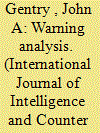

|
|
|
|
|
| Summary/Abstract |
Warning intelligence has traditionally focused on indicators of major military attacks by states against other states. In the United States, the lessons of the Japanese attack on Pearl Harbor in 1941 and the long rivalry with the Soviet Union produced an “indications and warning” (I&W) methodology that studied the military forces and doctrines of potential enemies in order to develop indicators of likely attack. When those indicators were present, a warning message was considered prudent. The classic statement of this approach is Cynthia Grabo's Handbook of Warning Intelligence.
|
|
|
|
|
|
|
|
|
|
|
|
|
|
|
|
|
|
|
|
|